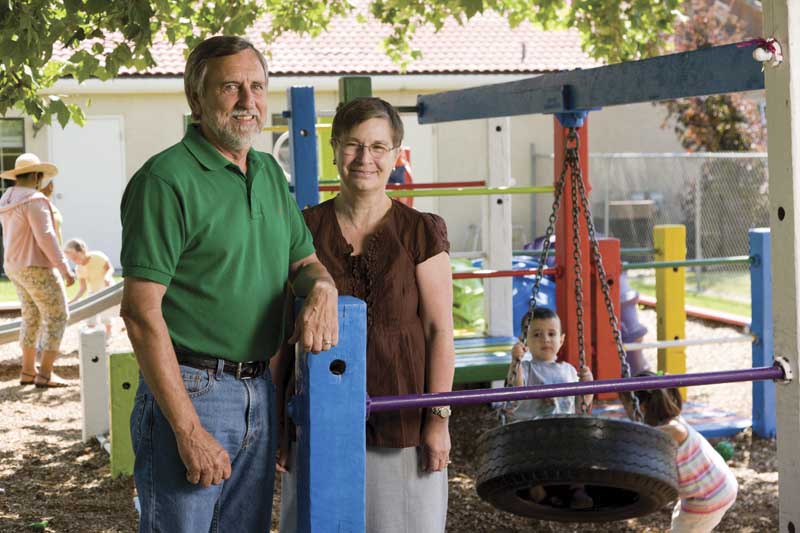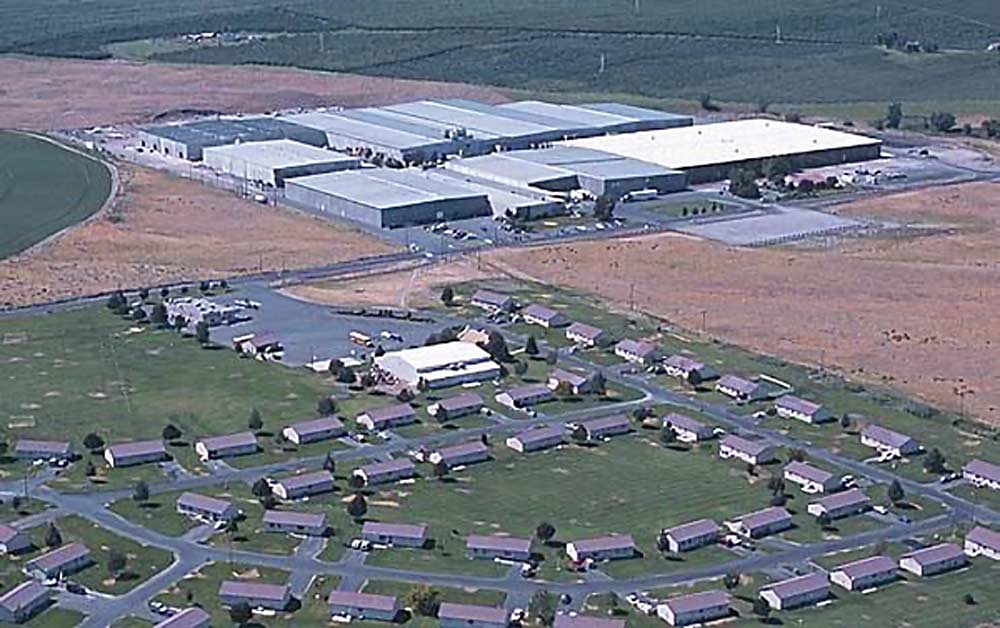
Ralph and Cheryl Broetje (Courtesy Broetje Orchards)
Ralph Broetje, who runs a family orchard of more than 6,000 acres in Washington State, is always focused on the bottom line, but the business decisions he makes are not dollar driven.
Rather, Broetje is concerned about what he calls the “triple bottom line,” which means balancing profits, people, and the environment.Broetje and his wife, Cheryl, bought their first orchard consisting of 60 acres of cherries and 20 acres of apples at Benton City, Washington, 40 years ago.
The expansion of their acreage has been driven not only by Ralph’s love of growing fruit, but by a desire to keep people employed and to generate funds to help the less fortunate around the world. Broetje Orchards consistently donates between 65 and 75 percent of its annual net profits to mission projects.
“I have been blessed with this opportunity that most people don’t have, so we need to be good stewards and use it to benefit as many people as we can,” explained Broetje, who expects to pack six million boxes of apples this season.
High interest rates
But the Broetjes faced some difficult times as orchardists at first. They sold their Benton City orchard in 1979 and bought a home and orchard in Yakima, where Ralph’s father and grandfather farmed. They also bought a 400-acre piece of irrigated land on the Snake River, near Prescott, Washington, which was not an apple-growing region at the time. But it had a long growing season, and Broetje was interested in new, later-maturing varieties.
In 1982, when interest rates were high, they were unable to obtain operating loans for their Yakima orchard. The couple decided to sell their Yakima home and orchard and move with their three young daughters to Prescott.
It turned out to be an excellent site for growing fruit. The first year, he planted 400 acres of Granny Smith and Red Delicious, and expanded with another 600 acres of Grannies the following year. He kept expanding the orchard, focusing on new varieties, such as Fuji, Gala, and Braeburn. “We’ve had some amazing crops,” Broetje reflected.
During a mission trip to Mexico soon afterwards, the family began to understand why Mexican people came to the United States in search of better opportunities. Broetje had a flashback to a dream he’d had as a teenager that someday he would have an apple orchard and be able to help the less fortunate, especially people in India.
“It just woke me up to why I was growing apples—not only because I was blessed with the opportunity to do what I love to do, but the bigger reason behind it is to return as much as we can to other people who don’t have the same opportunities, and support people who are doing that work around the world,” he said.
Ralph and Cheryl began supporting missions financially and talked about what they could do when their orchard started making a profit. “Back then, we were still in financial trouble because of the high interest rates and debt load we had,” he recalled.
Vertically integrated
In 1987, their banker encouraged them to become vertically integrated and build a packing plant. They were by then producing about a million boxes of apples and had been hauling them more than a hundred miles to a packing house in Yakima. They chose the label, First Fruits, to remind them of their commitment to give to others. The logo depicts an apple in the hands of their son Trevor, the first of six children they adopted from India.
The packing house opened up more full-time jobs. After hearing of children being locked up while their parents worked, or of older children being kept out of school to look after the younger ones, the Broetjes built a preschool next to the packing house and later an elementary school.
Next, they invested $5 million to build 121 family houses and apartments at the orchard, which they rent to workers at well below market rates.
The self-sustaining Vista Hermosa community includes a church, post office, grocery store, gym, soccer field, and playgrounds.
Donate profits
The Prescott orchard includes a 50-acre block of cherries that didn’t produce well in the first few years. By 1992, Broetje was ready to take out the trees and replant with apples, but he and Cheryl decided that if they were lucky enough to have a crop the following year, they would donate all the profits to a mission project.
Proceeds from the following year’s bumper crop went to an orphanage in Mexico that they had visited, where about 50 children were housed in a concrete warehouse, and helped pay for a new facility and dormitory. The entire profits from that cherry orchard have been donated to mission projects ever since. Nowadays, workers at the Broetje packing house decide how to use the proceeds. They meet several times a year to research deserving projects around the world.
“I think it just helps them share in the excitement of giving to other people having greater needs than they do themselves,” Broetje said. “It’s exciting to see what they choose to support.”
The Vista Hermosa Foundation is the charitable arm of Broetje Orchards and distributes the profits from the overall operation to many local and international projects (see “Orchard donates millions to missions,” page 19).
2,000 employees
Broetje said his main role is to take care of the orchard and provide the resources for the people involved in mission work to do even more to help those in need. He loves to be outside every day growing fruit. Office work is more of a burden, so he lets his staff take care of that. He has neither a computer nor cell phone.
His orchard at Prescott has grown to more than 5,000 acres, and he now has 600 acres in Benton City to the north and 675 acres of organic apples at Wallula to the south. However, it is still a family business and has not been incorporated. Six of the Broetjes’ children play key roles.
Broetje has 900 full-time employees, many of whom have been with him for a long time, but finding seasonal workers has been more difficult the last couple of years. At peak harvest, he needs more than 2,000 workers for the orchard and packing house. In the mid-1990s, he planted Red Delicious apples, just to provide work for pickers midseason, but keeping enough people until November has been harder as more growers have planted later varieties.
Broetje said he’s not yet moving towards mechanization in the orchard and relies on word of mouth to draw workers. Ensuring a livable wage for employees is one of the company’s goals.
“We try to pay as well as anybody,” he said. “We also really focus on how they’re treated and make them feel good about being here, and feel good about the supervisors they’re working with.”
Servant leadership
Cheryl teaches servant leadership, which has been adopted at the orchard. This style of management promotes the core values of love, community, respect, compassion, and purpose. Managers are encouraged to think in terms of serving the needs of the people doing the work and helping them to reach their greatest potential.
“The true test of servant-leadership management is, are the least privileged of society better off or further deprived by the way they are treated?” Ralph Broetje said. “Are we helping people grow, and feel more respected and loved by being here, and have more self confidence, or do we put them down and make them feel less? It’s helped us really learn to treat people right.”
Faith in action

Broetje Orchards facility. (Courtesy Broetje Orchards)
Fruit grower and philanthropist Ralph Broetje of Prescott, Washington, has been named Good Fruit Grower of the Year for 2008.
The award is made annually to an innovative and inspiring grower or orchard manager in North America who is a good employer, a good steward, and focuses on growing quality fruit.
Broetje and his family have more than 6,000 acres of orchard and have used the profits of the successful fruit growing and packing operation to serve the needs of their employees and the less fortunate around the world. Broetje’s business philosophy is “faith in action.”
Broetje said he accepted the award on behalf of all the people who made it possible, including his wife, Cheryl, and their family, who have worked hard and made sacrifices over the years. Nor would it have been possible without his suppliers and the customers who buy the fruit, and the hundreds of people who work in his orchards and packing house, and their families. “Without all their hard work and dedication over the years, none of this would have happened,” he said.
Mark Tudor, a member of the Good Fruit Grower Advisory Board, said there are two sides to Ralph Broetje. On the one hand, he is a very progressive grower who was among the first, along with legend Grady Auvil, to plant Granny Smith and other new varieties. On the other hand, he’s been dedicated to serving the needs of other people. He’s built housing, a daycare, and a school for his employees and their families, and dedicated most of the profits from his orchard and packing operation to help people in need.
“I’m not sure how he’s done it,” Tudor said. “To me, it’s a pretty amazing accomplishment for an individual to do that.”
Tudor said Broetje looks at his operation as a vehicle to accomplish the good he wants to do in the world, rather than as a source of revenue for himself. He treats his employees as part of the team, and they believe in what he is doing.
Keith Mathews, who worked for several years for L & M in Selah, Washington, which markets Broetje’s fruit, described Broetje as a perceptive businessman with a sharp mind. He demonstrates his faith in God in the way he cares for the resources of his business.
“In my lifetime, I think I’ve met four or five one-in-a-million people who have the right combination of intelligence and understanding and entrepreneurial nature to start with almost nothing in this world and end up with very significant assets,” Mathews said.
But few measure up to Ralph’s standard in terms of caring for their employees and others, he added.

Leave A Comment